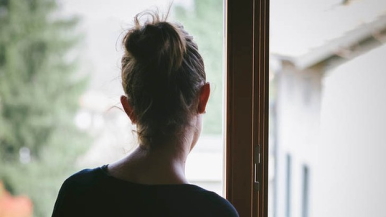
Feb 4, 2016 | Focolare Worldwide
 The sign from heaven While I was waiting to have a check-up at the doctor’s, I happened to hear a lady pregnant with her fourth child, say to the secretary that she could not keep the child, given her economic conditions. “God will keep him in mind”, she concluded. Since I could not remain indifferent to this news, I immediately recounted this to my close friends, and together we decided to collect some funds among us. I then went to the doctor’s secretary to ask her to give the money to that lady without revealing its source. In the meantime we entrusted all this to God. Time passed and we did not know the outcome; somebody noted that the lady’s tummy continued to grow (we live in a small town where we all know one another) In the end, a beautiful baby was born. After a year I received the lady’s thanks, since she had guessed where that money had come from: “The day before the abortion, I had asked God to enlighten me on the right thing to do. Late in the evening, the doctor’s secretary came by with your envelope. For me it was a sign from heaven.” (R. – Italy) The iron Corina needed an iron. My first thought was to entrust her need to God’s providence. Later, a lady invited me to a parish breakfast. Since I had so many things to do, I felt like saying no. But I accepted just to make her happy. I found myself having coffee with some elderly ladies who were pleased to have a young person in their midst. It was there that I saw an acquaintance: she had bought an iron that was too heavy for her, and she asked me if I knew of anyone who needed it. I was happy and immediately thought of my prayer. (I.- Switzerland) While waiting for the train… I had been betrayed by the people I loved and had thus left the family to live on my own. I was severely depressed, and had tried to kill myself a few times. The last time was in a small train station. While I was waiting for the first train to throw myself on the rails, a nun joined me at the tracks and convinced me to desist. Then she took care of me, and introduced me to a rehab community that welcomed me with open arms. At first, I refused the love they showed me due to the hatred I harboured inside. Even if I did not want to hear about God, one of them convinced me to read the Bible. Little by little the hardness of my heart began to melt and faith started to grow inside me. Some years have passed and I have learned to forgive, love my neighbor and be patient… Now I have reconnected also with my relatives, I have a job, a home, and feel serene. Nothing happens by chance. Thanks to God who has made me experience his immense love! (C. – Italy)
The sign from heaven While I was waiting to have a check-up at the doctor’s, I happened to hear a lady pregnant with her fourth child, say to the secretary that she could not keep the child, given her economic conditions. “God will keep him in mind”, she concluded. Since I could not remain indifferent to this news, I immediately recounted this to my close friends, and together we decided to collect some funds among us. I then went to the doctor’s secretary to ask her to give the money to that lady without revealing its source. In the meantime we entrusted all this to God. Time passed and we did not know the outcome; somebody noted that the lady’s tummy continued to grow (we live in a small town where we all know one another) In the end, a beautiful baby was born. After a year I received the lady’s thanks, since she had guessed where that money had come from: “The day before the abortion, I had asked God to enlighten me on the right thing to do. Late in the evening, the doctor’s secretary came by with your envelope. For me it was a sign from heaven.” (R. – Italy) The iron Corina needed an iron. My first thought was to entrust her need to God’s providence. Later, a lady invited me to a parish breakfast. Since I had so many things to do, I felt like saying no. But I accepted just to make her happy. I found myself having coffee with some elderly ladies who were pleased to have a young person in their midst. It was there that I saw an acquaintance: she had bought an iron that was too heavy for her, and she asked me if I knew of anyone who needed it. I was happy and immediately thought of my prayer. (I.- Switzerland) While waiting for the train… I had been betrayed by the people I loved and had thus left the family to live on my own. I was severely depressed, and had tried to kill myself a few times. The last time was in a small train station. While I was waiting for the first train to throw myself on the rails, a nun joined me at the tracks and convinced me to desist. Then she took care of me, and introduced me to a rehab community that welcomed me with open arms. At first, I refused the love they showed me due to the hatred I harboured inside. Even if I did not want to hear about God, one of them convinced me to read the Bible. Little by little the hardness of my heart began to melt and faith started to grow inside me. Some years have passed and I have learned to forgive, love my neighbor and be patient… Now I have reconnected also with my relatives, I have a job, a home, and feel serene. Nothing happens by chance. Thanks to God who has made me experience his immense love! (C. – Italy)
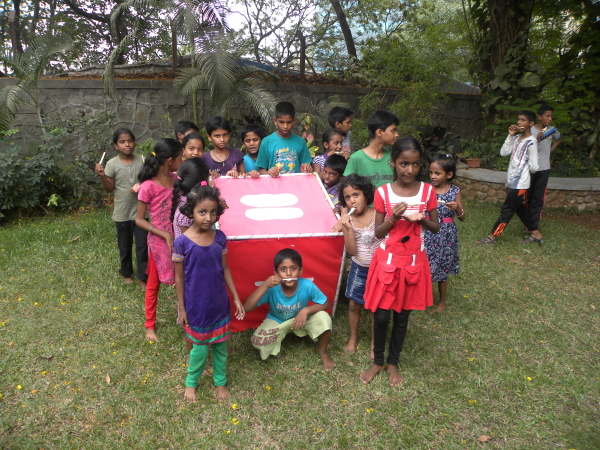
Feb 3, 2016 | Focolare Worldwide
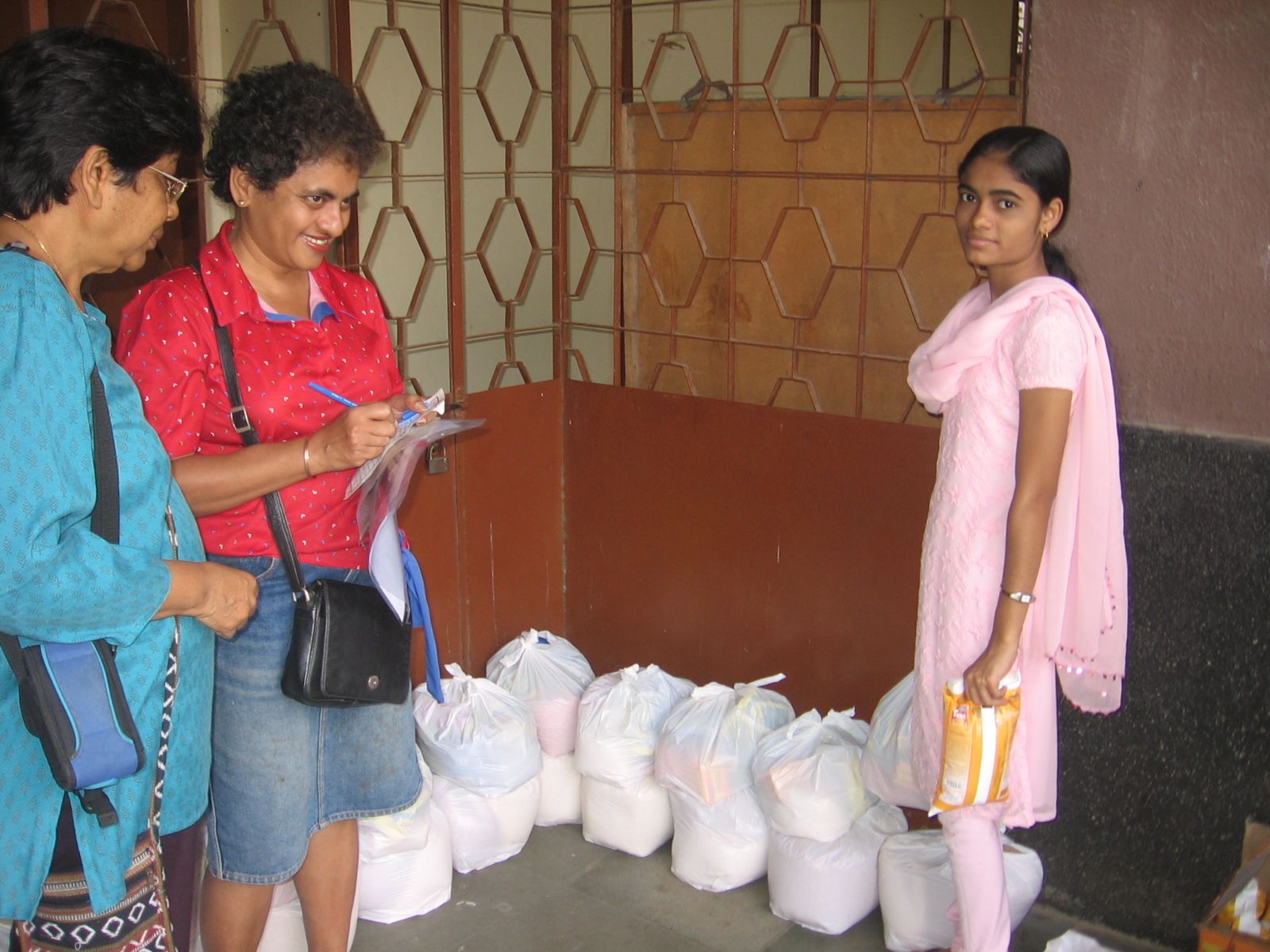 “One can either walk away from the problems in another’s life or embrace the challenge head on. For a Movement that has chosen the suffering face of Jesus on the Cross, it is only natural that the Focolare in Mumbai chose to welcome the challenges among its communities with love and dedication,” writes Annabel, a young journalist, member of the Focolare in Mumbai. Santacruz Project and Udisha have come to symbolize the Movement’s strong commitment to social justice, universal fraternity and, above all, love for Jesus in the other in this city. Santacruz Project started in 1992 as a direct response to the needs of families struggling with poverty, addictions and lack of jobs. It provides basic food rations and household supplies so that children from these homes can continue their education. “We realized that many of these little girls attending our activities didn’t even have enough to eat at home. In order to love them concretely, we had to empower their families to give them enough food and keep them in school. We struggled initially to fund this project, pulling together our resources and gathering contributions from the larger Focolare family here in India. I’m happy that we’ve been able to sustain this project for over 25 years now,” says Joan Viegas, one of the earliest volunteers from Mumbai involved in the project. “Somewhere along the way we realized that spiritual nourishment was equally necessary for these families to face society’s challenges. We organized Word of Life meetings for the girls’ mothers who desperately needed a space to express themselves, share their troubles and find spiritual strength. One of us, Josephine Passanha who is passed away, started conducting meetings in Konkani for these women who could not speak English, and also organized useful workshops on life skills such as budgeting and family planning to empower them.“
“One can either walk away from the problems in another’s life or embrace the challenge head on. For a Movement that has chosen the suffering face of Jesus on the Cross, it is only natural that the Focolare in Mumbai chose to welcome the challenges among its communities with love and dedication,” writes Annabel, a young journalist, member of the Focolare in Mumbai. Santacruz Project and Udisha have come to symbolize the Movement’s strong commitment to social justice, universal fraternity and, above all, love for Jesus in the other in this city. Santacruz Project started in 1992 as a direct response to the needs of families struggling with poverty, addictions and lack of jobs. It provides basic food rations and household supplies so that children from these homes can continue their education. “We realized that many of these little girls attending our activities didn’t even have enough to eat at home. In order to love them concretely, we had to empower their families to give them enough food and keep them in school. We struggled initially to fund this project, pulling together our resources and gathering contributions from the larger Focolare family here in India. I’m happy that we’ve been able to sustain this project for over 25 years now,” says Joan Viegas, one of the earliest volunteers from Mumbai involved in the project. “Somewhere along the way we realized that spiritual nourishment was equally necessary for these families to face society’s challenges. We organized Word of Life meetings for the girls’ mothers who desperately needed a space to express themselves, share their troubles and find spiritual strength. One of us, Josephine Passanha who is passed away, started conducting meetings in Konkani for these women who could not speak English, and also organized useful workshops on life skills such as budgeting and family planning to empower them.“ 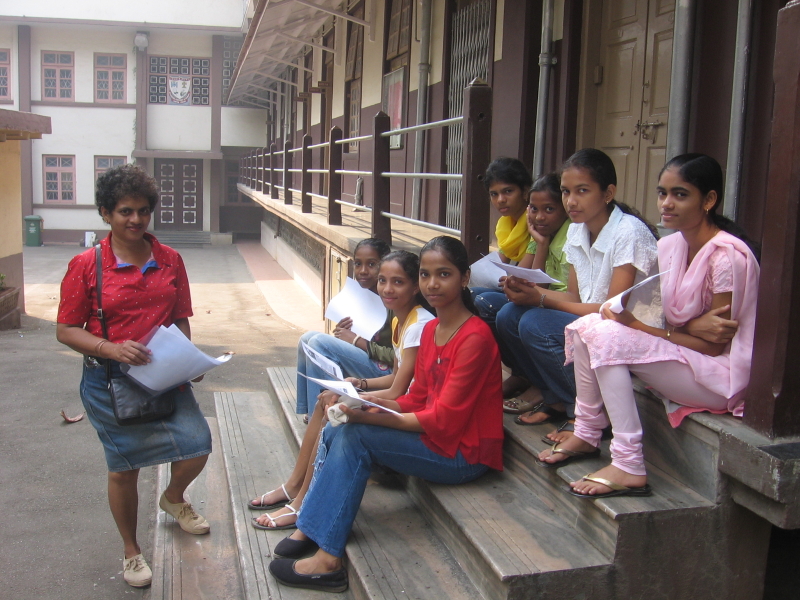 During her first visit to India in 2001, Chiara encouraged the members of the Focolare in Mumbai to reach out even further to people at the periphery of society. This gave a strong thrust to the already on-going Udisha Project in Goregaon which focusses on the holistic development of children from underprivileged backgrounds. Literally translating as a ‘ray of light’ in Sanskrit, Udisha is lighting up the lives of over 120 children today through its various activities such as academic tuition classes, occupational therapy, anger management sessions, medical camps and programs promoting value education and parenting skills. Counselling has becoming one of Udisha’s key specialisations, helping many children and their parents solve many day-to-day challenges, sometimes even saving lives from suicidal tendencies. Self-Help Groups empower mothers of these children to manage their household income and supplement it by starting small enterprises such as crochet bag making, catering and beautician services.
During her first visit to India in 2001, Chiara encouraged the members of the Focolare in Mumbai to reach out even further to people at the periphery of society. This gave a strong thrust to the already on-going Udisha Project in Goregaon which focusses on the holistic development of children from underprivileged backgrounds. Literally translating as a ‘ray of light’ in Sanskrit, Udisha is lighting up the lives of over 120 children today through its various activities such as academic tuition classes, occupational therapy, anger management sessions, medical camps and programs promoting value education and parenting skills. Counselling has becoming one of Udisha’s key specialisations, helping many children and their parents solve many day-to-day challenges, sometimes even saving lives from suicidal tendencies. Self-Help Groups empower mothers of these children to manage their household income and supplement it by starting small enterprises such as crochet bag making, catering and beautician services.  “Udisha has evolved into a full-fledged organisation with the help of the larger Focolare community all over Mumbai, as well as with the Support at a Distance help we receive from the New Families Movement of the Focolare”, says Brian D’Silva, who has been spearheading the project since the beginning. “We try to reach out to more families every day, always bearing in mind that it is Jesus who we serve in each individual. It gives me great satisfaction to see our children from Udisha who are well-educated, employed and positively contributing to society today.”
“Udisha has evolved into a full-fledged organisation with the help of the larger Focolare community all over Mumbai, as well as with the Support at a Distance help we receive from the New Families Movement of the Focolare”, says Brian D’Silva, who has been spearheading the project since the beginning. “We try to reach out to more families every day, always bearing in mind that it is Jesus who we serve in each individual. It gives me great satisfaction to see our children from Udisha who are well-educated, employed and positively contributing to society today.”
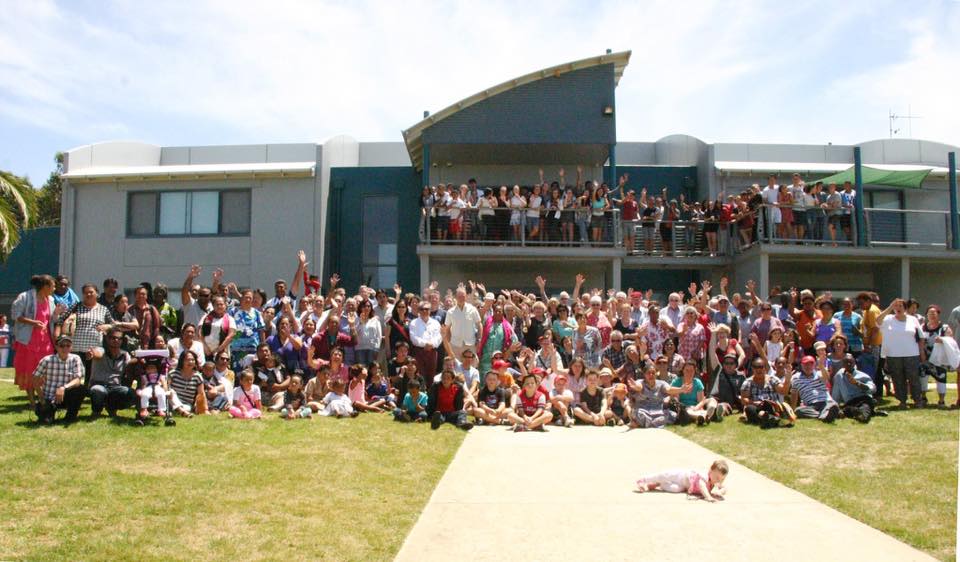
Feb 1, 2016 | Focolare Worldwide, Senza categoria
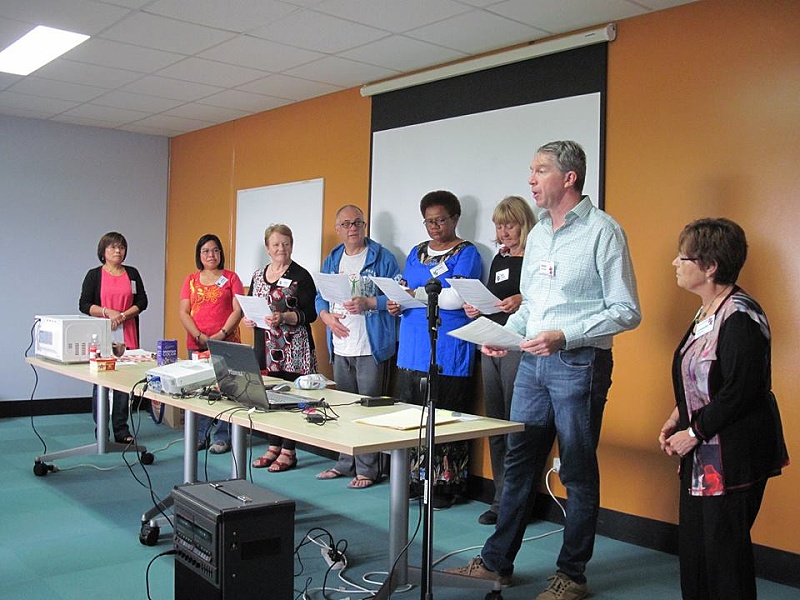 Five hundred and forty people from different countries – half of them families and young people – were together for four days. There were two refugees from Burundi and a group from Syria, 169 people from the Pacific Islands (New Caledonia, Wallis & Futuna, Fiji and Kiribati). The Mariapolis was held on January 13-17 on Phillip Island, 150 km from Melbourne (Australia). The title chosen for the event was “Building Unity Together”. The organisers write: “This central point of the spirituality of unity was examined in a formal presentation and immediately embraced and lived out each day of the Mariapolis by all the participants, some of them from very different cultural backgrounds.”
Five hundred and forty people from different countries – half of them families and young people – were together for four days. There were two refugees from Burundi and a group from Syria, 169 people from the Pacific Islands (New Caledonia, Wallis & Futuna, Fiji and Kiribati). The Mariapolis was held on January 13-17 on Phillip Island, 150 km from Melbourne (Australia). The title chosen for the event was “Building Unity Together”. The organisers write: “This central point of the spirituality of unity was examined in a formal presentation and immediately embraced and lived out each day of the Mariapolis by all the participants, some of them from very different cultural backgrounds.” 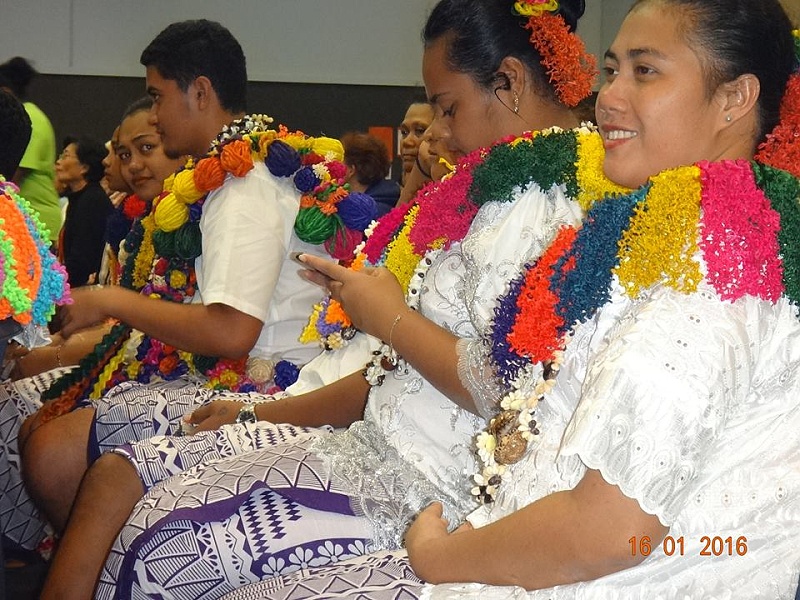 The people who came from the Pacific Islands made a great contribution beginning from their common witness of raising the money to be there: “like the representative from Kiribati who took leave of his work as a seaman in order to be able to attend. There were many beautiful testimonies of Gospel living and how they managed to overcome the many economic problems and raise the money to pay for the flight and lodging. A communion of goods was set in motion a bit like that of the early Christians, and it made everyone experience God’s personal love for them because of the Providence that arrived in many different ways. When they arrived at the Mariapolis they spoke of finding the same family that was no different from the one they had left behind.”
The people who came from the Pacific Islands made a great contribution beginning from their common witness of raising the money to be there: “like the representative from Kiribati who took leave of his work as a seaman in order to be able to attend. There were many beautiful testimonies of Gospel living and how they managed to overcome the many economic problems and raise the money to pay for the flight and lodging. A communion of goods was set in motion a bit like that of the early Christians, and it made everyone experience God’s personal love for them because of the Providence that arrived in many different ways. When they arrived at the Mariapolis they spoke of finding the same family that was no different from the one they had left behind.”  Every day ended in an atmosphere of celebration and gratitude for each ethnic group that was represented, like a small slice of a united world. Everyone felt that “The unity of peoples was not a utopia.” The people from the islands stayed on for an extra week at the Mariapolis Centre in Melbourne, where they attended a course on family life. “Each day is like a mutual love competition, and we look forward to the next activity with much joy and enthusiasm. There’s a saying, “From little things big things grow”, and we’re sure that great things will grow from Jesus in our midst through our mutual love.” See on Facebook: Phillip Island Mariapolis 2016
Every day ended in an atmosphere of celebration and gratitude for each ethnic group that was represented, like a small slice of a united world. Everyone felt that “The unity of peoples was not a utopia.” The people from the islands stayed on for an extra week at the Mariapolis Centre in Melbourne, where they attended a course on family life. “Each day is like a mutual love competition, and we look forward to the next activity with much joy and enthusiasm. There’s a saying, “From little things big things grow”, and we’re sure that great things will grow from Jesus in our midst through our mutual love.” See on Facebook: Phillip Island Mariapolis 2016
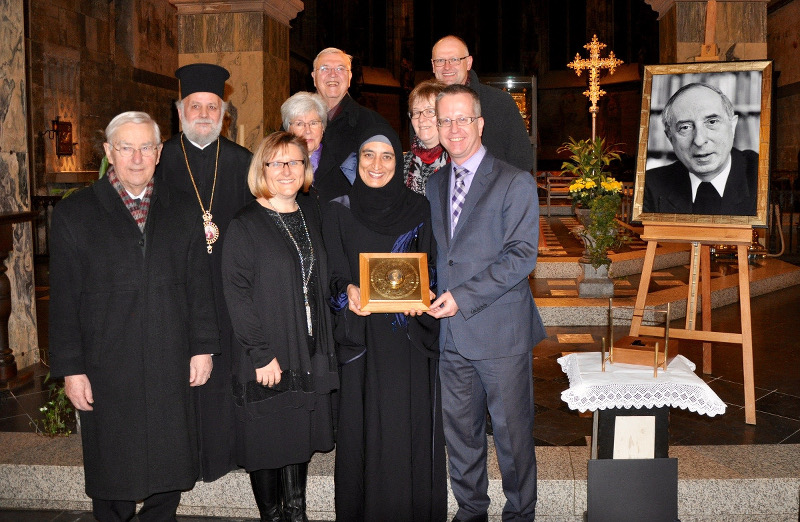
Jan 31, 2016 | Focolare Worldwide
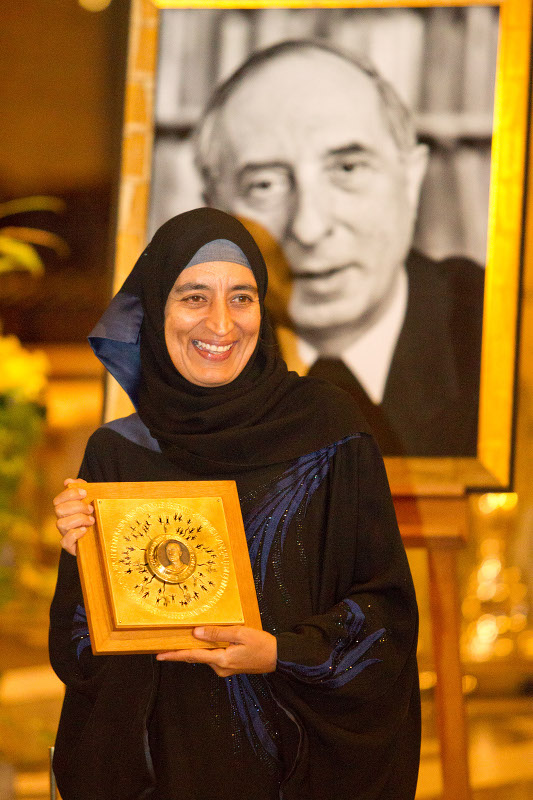
Foto: Martin Felder

Foto: Ulrike Comes
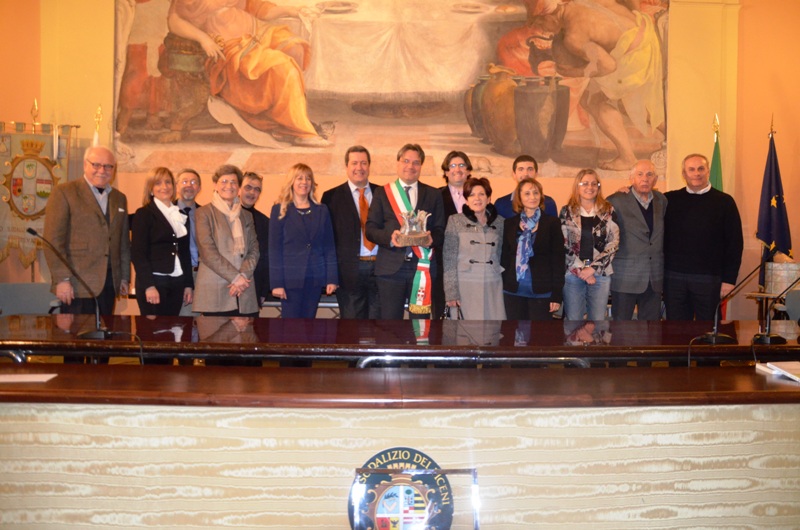
Jan 30, 2016 | Focolare Worldwide
 Asti, the Piedmont (Italy) municipality renowned worldwide for its wines and an old pre-Roman settlement, boasts another first: that of being the first Italian municipality to have inserted the principle of Fraternity in its Municipal Statutes, as one of the main inspiring principles. «The Municipality of Asti considers the value of Fraternity as the condition for its political actions, in the common awareness that diversity is enrichment and to which every person elected in this institution is subjected to, and who should thus be recognised with equal dignity and respect and is therefore called to place the good of the community before partial interests, whether personal, of the group or the political party.» This is the text that passed with a unanimous vote on 19 February 2015, and won for the Municipality, the prize awarded in Rome by Mayor Fabrizio Brignolo last 22 January. How is this inspiring principle concretely practiced by the citizens? At the awarding of the prize, the Mayor of Asti recalled how the Asti community is very active in projects that express the value of fraternity in a concrete way: in the issue of welcoming the refugees with individual projects, a system of social services that targets to involve the beneficiaries in projects of recovery of independence in the employment and social fields, to name a few. So is the Municipality’s political life very simple? Not at all. A municipal councillor said: «The truth is, despite the fact that our ideals and political and cultural differences will not be eliminated, it also holds that moments of tension and conflicts will not be missing in our political –administrative debate. But it is likewise true that, from today onwards, we have a reference point and an extra precious tool that pushes us to seek the grounds for sharing, and in which we can exercise a serene approach to the building of fraternity. It is certainly a difficult challenge which we intend to win with courage and confidence. » The prize of the association, Cities for Fraternity, was awarded last 22 January by the president, Milvia Monachesi, Mayor of Castelgandolfo, together with Alba Sgariglia and João Manuel Motta of the Chiara Lubich Centre of the Focolare Movement, during the convention entitled, “Can Fraternity become a norm?” emceed by the journalist, Gianni Bianco, in the capital’s Hall, Pio Sodalizio dei Piceni (watch the live shoot ). Of great significance were the speeches of Prof. Filippo Pizzolato (Bicocca University, Milan) and Tiziano Vecchiato (Scientific Director of the Zancan Foundation, Padova), and the round table of the experiences and conflicts of the Municipalities that have inserted the principle of fraternity in their statutes: Asti, Bra, Grottaferrata and Rocca di Papa. Other honours were conferred to three other Municipalities: • Special Honours for the City of Rocca di Papa, which had launched the project of United Cities for Fraternity: «From darkness to light: “Wednesdays in the village”» with the mission to “enlighten the outstanding features and reunite hearts and minds” of the inhabitants – both Italians and of other nationalities – of Rocca di Papa. • Special Honours for the Municipality of Tolentino for the project, “Tolentino – city for fraternity” and the organisation of the “Fraternity Dinner,” a traditional event with the cooperation of the voluntary associations and citizens, where the funds collected were assigned to the poor people in the municipality. • Special Honours for the Municipality of Grottaferrata for the insertion of the value of Fraternity in the Municipal Statutes, as the condition for political action, unanimously approved by the Municipal Council on 27 April 2015. https://www.youtube.com/watch?v=cEtFoAdo6IE https://www.youtube.com/watch?v=P9bfpKF30Wk
Asti, the Piedmont (Italy) municipality renowned worldwide for its wines and an old pre-Roman settlement, boasts another first: that of being the first Italian municipality to have inserted the principle of Fraternity in its Municipal Statutes, as one of the main inspiring principles. «The Municipality of Asti considers the value of Fraternity as the condition for its political actions, in the common awareness that diversity is enrichment and to which every person elected in this institution is subjected to, and who should thus be recognised with equal dignity and respect and is therefore called to place the good of the community before partial interests, whether personal, of the group or the political party.» This is the text that passed with a unanimous vote on 19 February 2015, and won for the Municipality, the prize awarded in Rome by Mayor Fabrizio Brignolo last 22 January. How is this inspiring principle concretely practiced by the citizens? At the awarding of the prize, the Mayor of Asti recalled how the Asti community is very active in projects that express the value of fraternity in a concrete way: in the issue of welcoming the refugees with individual projects, a system of social services that targets to involve the beneficiaries in projects of recovery of independence in the employment and social fields, to name a few. So is the Municipality’s political life very simple? Not at all. A municipal councillor said: «The truth is, despite the fact that our ideals and political and cultural differences will not be eliminated, it also holds that moments of tension and conflicts will not be missing in our political –administrative debate. But it is likewise true that, from today onwards, we have a reference point and an extra precious tool that pushes us to seek the grounds for sharing, and in which we can exercise a serene approach to the building of fraternity. It is certainly a difficult challenge which we intend to win with courage and confidence. » The prize of the association, Cities for Fraternity, was awarded last 22 January by the president, Milvia Monachesi, Mayor of Castelgandolfo, together with Alba Sgariglia and João Manuel Motta of the Chiara Lubich Centre of the Focolare Movement, during the convention entitled, “Can Fraternity become a norm?” emceed by the journalist, Gianni Bianco, in the capital’s Hall, Pio Sodalizio dei Piceni (watch the live shoot ). Of great significance were the speeches of Prof. Filippo Pizzolato (Bicocca University, Milan) and Tiziano Vecchiato (Scientific Director of the Zancan Foundation, Padova), and the round table of the experiences and conflicts of the Municipalities that have inserted the principle of fraternity in their statutes: Asti, Bra, Grottaferrata and Rocca di Papa. Other honours were conferred to three other Municipalities: • Special Honours for the City of Rocca di Papa, which had launched the project of United Cities for Fraternity: «From darkness to light: “Wednesdays in the village”» with the mission to “enlighten the outstanding features and reunite hearts and minds” of the inhabitants – both Italians and of other nationalities – of Rocca di Papa. • Special Honours for the Municipality of Tolentino for the project, “Tolentino – city for fraternity” and the organisation of the “Fraternity Dinner,” a traditional event with the cooperation of the voluntary associations and citizens, where the funds collected were assigned to the poor people in the municipality. • Special Honours for the Municipality of Grottaferrata for the insertion of the value of Fraternity in the Municipal Statutes, as the condition for political action, unanimously approved by the Municipal Council on 27 April 2015. https://www.youtube.com/watch?v=cEtFoAdo6IE https://www.youtube.com/watch?v=P9bfpKF30Wk
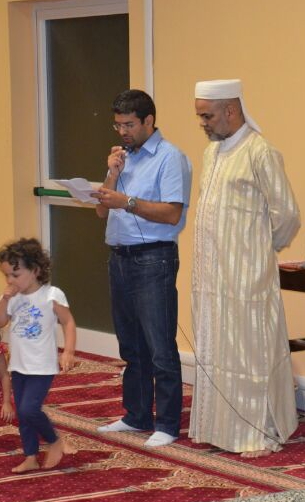
Jan 27, 2016 | Focolare Worldwide
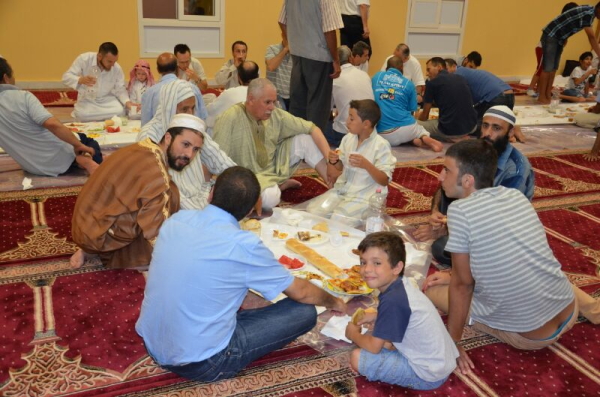 It all began in 2002, when the local community of the Focolare Movement met Mustapha Baztami, the Imam of the Muslim community of Teramo, truly a man of God who was so struck by the spirituality of unity that he has become its tireless promoter. Since then there have been many moments when both communities came together to share insights and reflections, such as how the Qur’an and the Bible view the family; they also gathered to share foods and flavours and seeing colours and fragrances blend into one, like the people who savoured them. But the real challenge has been to make a joint experience of friendship and solidarity as Muslims and Christians . One day Mustapha’s wife had a serious accident. The prolonged hospitalisation, also in other cities of Italy, gave the Focolare community the opportunity to stand at their side as brothers and sisters. It was like a contest of love between those who gave and those who received, and that became fertile ground for other initiatives, such as the creation of a literary competition called “Different but one”. For the past fifteen years they have made the weekly commitment to work side by side throughout the whole year. “Being children of God is what unites us. This is what gives you the freedom to share your story at the microphone, or to simply smile at a joke, or letting a few tears fall without feeling embarrassed,” states Donato of the Focolare. “You look at me without prejudices,” affirms a Muslim woman.
It all began in 2002, when the local community of the Focolare Movement met Mustapha Baztami, the Imam of the Muslim community of Teramo, truly a man of God who was so struck by the spirituality of unity that he has become its tireless promoter. Since then there have been many moments when both communities came together to share insights and reflections, such as how the Qur’an and the Bible view the family; they also gathered to share foods and flavours and seeing colours and fragrances blend into one, like the people who savoured them. But the real challenge has been to make a joint experience of friendship and solidarity as Muslims and Christians . One day Mustapha’s wife had a serious accident. The prolonged hospitalisation, also in other cities of Italy, gave the Focolare community the opportunity to stand at their side as brothers and sisters. It was like a contest of love between those who gave and those who received, and that became fertile ground for other initiatives, such as the creation of a literary competition called “Different but one”. For the past fifteen years they have made the weekly commitment to work side by side throughout the whole year. “Being children of God is what unites us. This is what gives you the freedom to share your story at the microphone, or to simply smile at a joke, or letting a few tears fall without feeling embarrassed,” states Donato of the Focolare. “You look at me without prejudices,” affirms a Muslim woman.  The effects of this dialogue haven’t gone unnoticed in the region. A Catholic association invited Mustapha and Donato to speak at an Islamic-Christian seminar. Things were going well, but the views of some participants regarding women in Islam created tensions in the hall. Mustapha and Donato interceded by saying that their friendship was based on a mutual desire to love which rises above culture and religion, seeking what unites rather than what might divide. “My life has changed dramatically,” says Mustapha, “since I met Chiara Lubich, a white and western Christian woman. She taught me to love everyone and to be the first to love.” From that moment on, the seminar took a different turn. One of the organizers went up to embrace him, saying, “Brother, I have realized that human reasoning is nothing compared to love.” Summer came and with it the desire to go on a family trip to the mountains together with the two communities. Upon arrival, the Muslim men unloaded flour, meat, vegetables, spices, pots and pans, while the women took their place in the kitchen in the nearby refectory. The Christians were no different: they took out homemade bread, stuffed olives and chicken dishes. As on any outing spent with friends, there were children’s games, chats, couscous, tea, long walks. Though totally unplanned, each moment was precious in consolidating a friendship that had gradually grown deeper. The next day, Mustapha sent a message saying, “… Let us ask God, the Most High, to continue illuminating our common pathways.” When the local bishop was asked to report to the prefecture on the relationship of his Catholic diocese with the Islamic community, he made reference to this experience of true dialogue.
The effects of this dialogue haven’t gone unnoticed in the region. A Catholic association invited Mustapha and Donato to speak at an Islamic-Christian seminar. Things were going well, but the views of some participants regarding women in Islam created tensions in the hall. Mustapha and Donato interceded by saying that their friendship was based on a mutual desire to love which rises above culture and religion, seeking what unites rather than what might divide. “My life has changed dramatically,” says Mustapha, “since I met Chiara Lubich, a white and western Christian woman. She taught me to love everyone and to be the first to love.” From that moment on, the seminar took a different turn. One of the organizers went up to embrace him, saying, “Brother, I have realized that human reasoning is nothing compared to love.” Summer came and with it the desire to go on a family trip to the mountains together with the two communities. Upon arrival, the Muslim men unloaded flour, meat, vegetables, spices, pots and pans, while the women took their place in the kitchen in the nearby refectory. The Christians were no different: they took out homemade bread, stuffed olives and chicken dishes. As on any outing spent with friends, there were children’s games, chats, couscous, tea, long walks. Though totally unplanned, each moment was precious in consolidating a friendship that had gradually grown deeper. The next day, Mustapha sent a message saying, “… Let us ask God, the Most High, to continue illuminating our common pathways.” When the local bishop was asked to report to the prefecture on the relationship of his Catholic diocese with the Islamic community, he made reference to this experience of true dialogue.

 The sign from heaven While I was waiting to have a check-up at the doctor’s, I happened to hear a lady pregnant with her fourth child, say to the secretary that she could not keep the child, given her economic conditions. “God will keep him in mind”, she concluded. Since I could not remain indifferent to this news, I immediately recounted this to my close friends, and together we decided to collect some funds among us. I then went to the doctor’s secretary to ask her to give the money to that lady without revealing its source. In the meantime we entrusted all this to God. Time passed and we did not know the outcome; somebody noted that the lady’s tummy continued to grow (we live in a small town where we all know one another) In the end, a beautiful baby was born. After a year I received the lady’s thanks, since she had guessed where that money had come from: “The day before the abortion, I had asked God to enlighten me on the right thing to do. Late in the evening, the doctor’s secretary came by with your envelope. For me it was a sign from heaven.” (R. – Italy) The iron Corina needed an iron. My first thought was to entrust her need to God’s providence. Later, a lady invited me to a parish breakfast. Since I had so many things to do, I felt like saying no. But I accepted just to make her happy. I found myself having coffee with some elderly ladies who were pleased to have a young person in their midst. It was there that I saw an acquaintance: she had bought an iron that was too heavy for her, and she asked me if I knew of anyone who needed it. I was happy and immediately thought of my prayer. (I.- Switzerland) While waiting for the train… I had been betrayed by the people I loved and had thus left the family to live on my own. I was severely depressed, and had tried to kill myself a few times. The last time was in a small train station. While I was waiting for the first train to throw myself on the rails, a nun joined me at the tracks and convinced me to desist. Then she took care of me, and introduced me to a rehab community that welcomed me with open arms. At first, I refused the love they showed me due to the hatred I harboured inside. Even if I did not want to hear about God, one of them convinced me to read the Bible. Little by little the hardness of my heart began to melt and faith started to grow inside me. Some years have passed and I have learned to forgive, love my neighbor and be patient… Now I have reconnected also with my relatives, I have a job, a home, and feel serene. Nothing happens by chance. Thanks to God who has made me experience his immense love! (C. – Italy)
The sign from heaven While I was waiting to have a check-up at the doctor’s, I happened to hear a lady pregnant with her fourth child, say to the secretary that she could not keep the child, given her economic conditions. “God will keep him in mind”, she concluded. Since I could not remain indifferent to this news, I immediately recounted this to my close friends, and together we decided to collect some funds among us. I then went to the doctor’s secretary to ask her to give the money to that lady without revealing its source. In the meantime we entrusted all this to God. Time passed and we did not know the outcome; somebody noted that the lady’s tummy continued to grow (we live in a small town where we all know one another) In the end, a beautiful baby was born. After a year I received the lady’s thanks, since she had guessed where that money had come from: “The day before the abortion, I had asked God to enlighten me on the right thing to do. Late in the evening, the doctor’s secretary came by with your envelope. For me it was a sign from heaven.” (R. – Italy) The iron Corina needed an iron. My first thought was to entrust her need to God’s providence. Later, a lady invited me to a parish breakfast. Since I had so many things to do, I felt like saying no. But I accepted just to make her happy. I found myself having coffee with some elderly ladies who were pleased to have a young person in their midst. It was there that I saw an acquaintance: she had bought an iron that was too heavy for her, and she asked me if I knew of anyone who needed it. I was happy and immediately thought of my prayer. (I.- Switzerland) While waiting for the train… I had been betrayed by the people I loved and had thus left the family to live on my own. I was severely depressed, and had tried to kill myself a few times. The last time was in a small train station. While I was waiting for the first train to throw myself on the rails, a nun joined me at the tracks and convinced me to desist. Then she took care of me, and introduced me to a rehab community that welcomed me with open arms. At first, I refused the love they showed me due to the hatred I harboured inside. Even if I did not want to hear about God, one of them convinced me to read the Bible. Little by little the hardness of my heart began to melt and faith started to grow inside me. Some years have passed and I have learned to forgive, love my neighbor and be patient… Now I have reconnected also with my relatives, I have a job, a home, and feel serene. Nothing happens by chance. Thanks to God who has made me experience his immense love! (C. – Italy)










 It all began in 2002, when the local community of the
It all began in 2002, when the local community of the